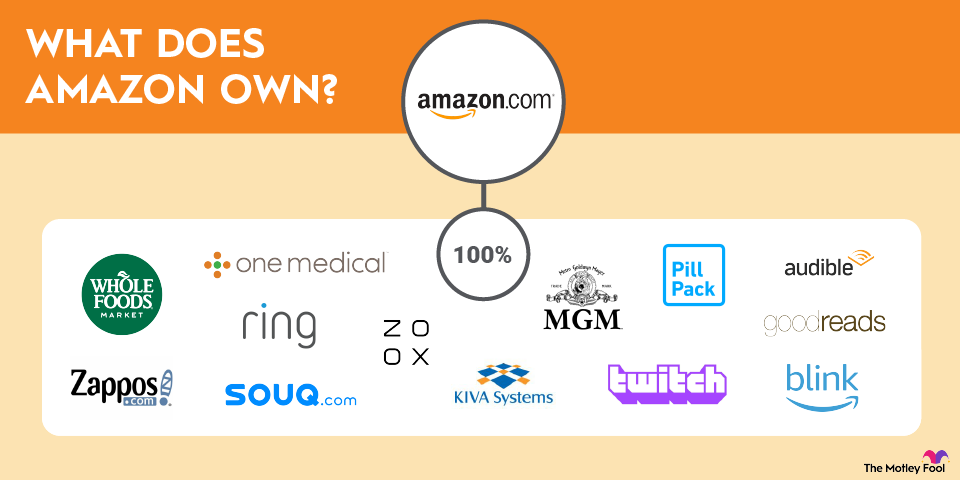Amazon (AMZN -1.80%) is a retail and cloud computing leader. The company rang up $155.7 billion in net sales in the first quarter of 2025, including $29.3 billion from Amazon Web Services (AWS). The technology behemoth is still growing briskly, with sales rising 9% in the period, while AWS' revenue jumped 17%.

The e-commerce giant has expanded into several new areas over the years, partly driven by acquiring other companies. Here's a look at some of the notable companies Amazon has purchased and ones it might buy in the future. Understanding the companies Amazon owns is an important aspect of investment research for those interested in learning how to invest money in its stock.
E-commerce
What companies does Amazon own?
Amazon has a large and increasingly diversified business. It's much more than an e-commerce site. While the company groups its operations into three segments (North America, International, and AWS), there are many moving parts.
The company owns a portfolio of e-commerce sites, manufactures several electronic devices (Alexa, Kindle, Fire, Ring, and Blink), and offers a variety of services through its Amazon Prime membership program, including video streaming (Prime Video), music streaming (Prime Music), and health services. It's also a large cloud services provider.
Amazon has built its business through heavy investment in research and development (R&D) and targeted acquisitions. Here's a look at the 10 largest companies Amazon has acquired throughout its history.
Whole Foods
Amazon bought natural and organic grocery store operator Whole Foods for $13.7 billion in 2017. The transaction provided Amazon with a physical retail presence. It's Amazon's biggest acquisition so far. Acquiring Whole Foods enables Amazon to offer grocery services to its customers.
Metro-Goldwin-Mayer (MGM)
Amazon bought MGM in 2021 for $8.5 billion. The deal provided the company with a treasure trove of content, including more than 4,000 movies and 17,000 TV shows. The acquisition complements Amazon Studios, which primarily focuses on producing TV shows. It also added content for the company's streaming services (Amazon Prime and Freevee, formally IMDb TV).

One Medical
The company purchased One Medical for $3.9 billion in cash in 2022. One Medical is a technology-powered primary care organization. Amazon sees the transaction as a way to transform the healthcare industry by leveraging its technology to make healthcare more accessible and affordable.
Zoox
The tech titan bought Zoox in 2020 for $1.2 billion. The self-driving vehicle start-up is working to develop a fully autonomous solution for ridesharing.
Zappos
Amazon bought online apparel and footwear sales platform Zappos.com in 2009. It paid an estimated $1.2 billion. The company continues to operate the website as part of its global e-commerce platform.
Ring
Amazon bought Ring, a video doorbell maker, for $1 billion in 2018. The transaction enabled Ring to accelerate its mission of reducing crime with its affordable home security products. Amazon has expanded Ring to include a subscription services component powered by AWS.
PillPack
The company purchased PillPack for $1 billion in 2018. PillPack is an online pharmacy. The acquisition is part of Amazon's move to help improve the healthcare sector.
Twitch
The technology company bought Twitch for $970 million in 2014. Twitch is the leading live video streaming platform for gamers. The deal broadened Amazon's reach into the gaming market.
Kiva Systems
Amazon bought robotics company Kiva Systems for $775 million in 2012. The company builds robots for warehouses. Now Amazon Robotics, Kiva has helped Amazon automate its distribution network.
Souq.com
Amazon bought Souq.com in 2017 for $580 million. Souq.com is an e-commerce leader in the Middle East, which was a new region for Amazon at the time of the deal. The acquisition has helped drive Amazon's international expansion.
In addition to these larger purchases, Amazon has also acquired a few other notable companies, including:
- Audible: It bought the spoken audio information and entertainment company for $300 million in 2008.
- Blink: Amazon bought video monitor company Blink for about $90 million in 2017.
- Goodreads: In 2013, the company paid $150 million for Goodreads, which helps users track the books they've read.
- IMDb: It bought the online database for the entertainment industry for $55 million in 1998. It has rebranded IMDb's streaming service as Amazon Freevee.

Amazon has also made a few notable investments in companies that it doesn't own, including:
- Rivian (RIVN +11.87%): Amazon owns 16.6% of the electric vehicle maker's shares. Rivian has a deal to supply Amazon with 100,000 electric delivery vans by 2030.
- Anthropic: Amazon signed a strategic collaboration agreement with Anthropic to advance generative artificial intelligence (AI) in 2023. At the time, it agreed to invest as much as $4 billion into the company for a minority stake. Amazon deepened its collaboration with Anthropic in late 2024, agreeing to invest another $4 billion into the AI company.
- Diamond Sports: It invested $115 million into the operator of regional sports channels, giving it a minority stake. The deal helped save Diamond, which was in bankruptcy and facing closure. The investment will allow Prime Video viewers to access some live sports content.
What companies could Amazon buy in the future?
Amazon has acquired more than 100 companies over the years. Many of its deals are smaller purchases of talent or technology. However, the company will make a larger acquisition when it finds the right product or platform fit.
It certainly has the financial flexibility to continue making big acquisitions as opportunities arise. The company had $101 billion of cash, equivalents, and marketable securities on its balance sheet at the end of the first quarter of 2025 against $52.6 billion of long-term debt. Meanwhile, its business is starting to generate massive free cash flow.
Mergers and Acquisitions
Brick-and-Mortar
In addition, CVS Healthcare has expanded deeper into the healthcare industry over the years. It has a pharmacy and consumer wellness segment, health services (including pharmacy benefits management), and a healthcare benefits provider.
A different path Amazon could take is to buy a cybersecurity company to bolster its AWS capabilities and compete with rivals like Microsoft (MSFT -1.02%). Palo Alto Networks (PANW +0.71%), CrowdStrike (CRWD -2.50%), and Zscaler (ZS -2.41%) are some of the leading cloud security providers.
Buying one of these companies would enable Amazon to provide even more security to AWS customers, similar to Alphabet's (GOOG -1.03%)(GOOGL -1.03%) Google subsidiary's $32 billion acquisition of Wiz to boost its cloud security offerings. It would also allow the company to tap into a massive and growing market. According to CrowdStrike, the total addressable market opportunity for its AI-native security platform will rise from $116 billion this year to $250 billion by 2029.
Related investing topics
The bottom line on companies Amazon owns
Amazon has been an active acquirer over the years, with more than 100 deals under its belt. While most of those have been smaller acquisitions of talent and technology, it has made some notable purchases like Whole Foods and Twitch, which have helped drive growth.
The company will likely try to continue making deals in the future, although it's becoming increasingly challenging from a regulatory perspective. However, if Amazon can find the right strategic acquisition that can pass regulatory scrutiny, it could help drive additional growth in the years ahead and make the tech titan an even better stock to buy and hold for the long term.



















